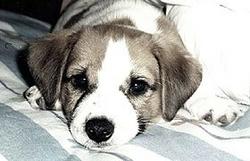 |
|
Age:
It is better to wait until animals are at a mature age. This is to ensure they have grown to a suitable size for breeding. In general dogs and cats should not be bred before their second season this usually occurs around 12-14 months of age for cats, and from 12-18 months of age for dogs (depending on their size and breed). A hormone treatment is available to prevent your pet becoming pregnant during the first heat period, however the effect may be unpredictable and the subsequent season may not come when expected.
Pre-Breeding:
Before breeding from your dog or cat, they should have a physical examination and we can discuss any potential transmissable problems. We may recommend screening procedures such as x-rays (e.g. for hip dysplasia in dogs), or blood tests (e.g. for feline leukaemia virus or feline immunodeficiency virus in cats, or heartworm disease in dogs), or a faecal test for intestinal parasites. Some breeders may require a swab to be taken from the vagina to assess the stage of oestrus and better predict time of mating with microscopic examination of vaginal cells. We recommend animals be fully vaccinated and wormed prior to mating.
Pregnancy:
Pregnancy can be confirmed by palpitation 4 weeks after mating and x-rays 42 days after mating. X-rays give an accurate indication of the number of pups/kittens - this is beneficial if there are any problems during the birth. Once mated, be careful with the use of any drug unless under veterinary supervision. Heartworm preventatives are safe. Proban should not be used. For flea control "Sentinel", "Program" "Advantage" and "Frontline" are safe to use in pregnancy. Worming is advised at least twice during pregnancy - once at pregnancy diagnosis, and also within 2 weeks of giving birth. Drontal is safe to use. Pregnancy lasts 63 days ± 3 days. A commercial food diet is recommended. Towards the end of pregnancy regular small feeds should be given, but overall intake should be high (up to twice normal intake).
Whelping/Kittening:
The mammary glands fill with milk and may even drip from about 7 days before giving birth. About 24 hours before birth dogs/cats get restless, stop eating, may pant and show "nesting behaviour". Once abdominal contractions start, note the time, and then disturb the mother as little as possible. Difficulties are not common but contact the vet if: - the first pup/kitten is not produced within 3 hours of straining.
- if more pups/kittens are obviously present and there has been no straining for over 2 hours.
|